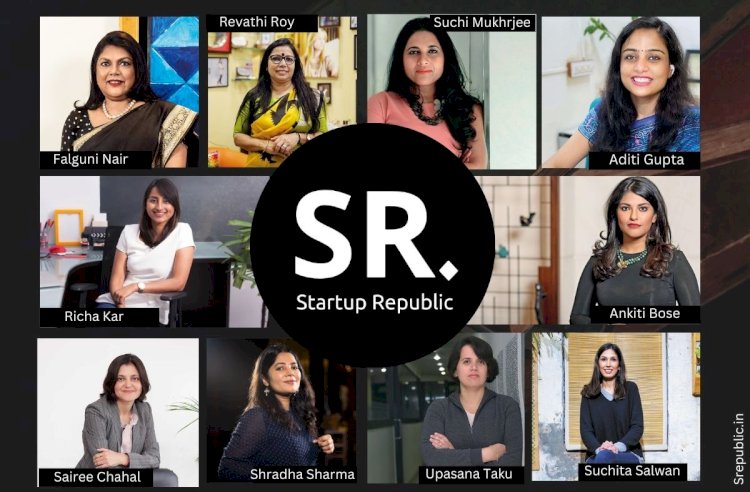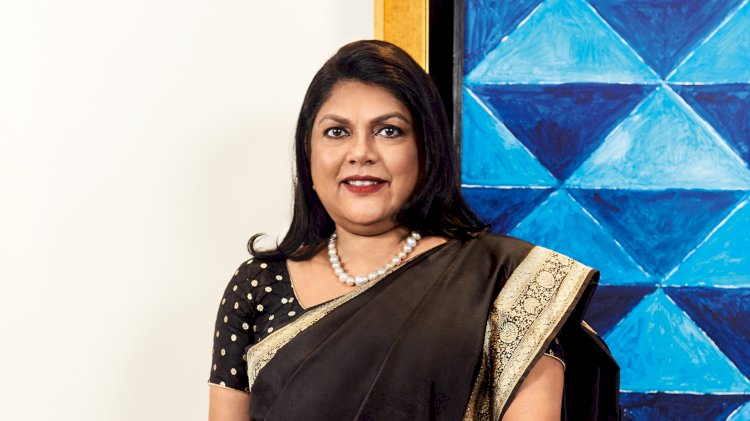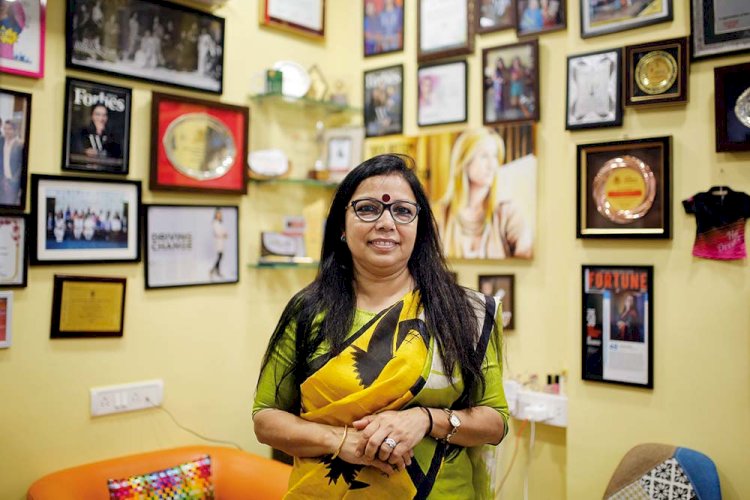The Rise of Female Founders: Empowering Women in the Startup Ecosystem

Introduction:
In recent years, a remarkable transformation has been underway in the startup landscape, as a growing number of women are breaking barriers and making their mark as entrepreneurs. The rise of female founders is not merely a passing trend but a seismic shift that is reshaping the startup ecosystem and empowering women in profound ways.
Through their innovative ideas, determination, and resilience, these trailblazing women are not only challenging traditional gender norms but also inspiring a generation of aspiring female entrepreneurs. In this blog, we delve deeper into the significant contributions and challenges faced by female founders and explore how they are driving change in the startup world.
Breaking Stereotypes: Shattering the Glass Ceiling
For decades, the startup industry has been predominantly male-dominated, perpetuating a gender imbalance that hindered the potential of countless talented women. However, the entrepreneurial landscape is evolving, and women are dismantling stereotypes by venturing into fields traditionally dominated by men.
In technology, finance, biotech, and various other sectors, female founders are leading the way, proving that entrepreneurship knows no gender boundaries. Their successes are dispelling the notion that women are better suited for supporting roles, and instead, they are establishing themselves as leaders, innovators, and visionaries.
- Falguni Nayar, the founder of Nykaa, revolutionized the beauty and cosmetics industry in India. Nykaa, an e-commerce platform, disrupted the market by providing a wide range of products and expert advice to consumers, challenging the notion that women entrepreneurs cannot succeed in traditionally male-dominated sectors.

- Richa Kar, the founder of Zivame, transformed the lingerie market by creating an online platform that offers personalized shopping experiences for women. Her success challenged societal taboos and empowered women to embrace their bodies and make informed choices.

Empowering Women: Unlocking Untapped Potential
The rise of female founders has far-reaching implications for society as a whole. By encouraging and supporting women in entrepreneurship, we tap into a vast pool of untapped potential and ideas. Empowering women in the startup ecosystem serves as a catalyst for economic growth, job creation, and technological advancement.
Female-led startups bring fresh perspectives, creative problem-solving approaches, and a keen focus on addressing underserved markets and needs. This diversity of thought leads to more inclusive and well-rounded entrepreneurial endeavors, ultimately benefiting the broader society.
- Suchi Mukherjee, founder of LimeRoad, created an online fashion marketplace that connects independent designers with consumers. Her platform disrupted the fashion industry, empowering small-scale designers and providing shoppers with unique and diverse fashion choices.

- Aditi Gupta, the founder of Menstrupedia, revolutionized menstrual health education in India. Through her startup, she introduced an illustrated guidebook that educates girls and breaks the stigma surrounding menstruation.

Overcoming Challenges: Navigating the Path to Success
While progress has been made, female founders continue to face unique challenges in their entrepreneurial journey. Access to funding remains a significant hurdle, as women-led startups receive disproportionately less venture capital compared to their male counterparts. This disparity arises from various factors, including unconscious bias, risk aversion, and a lack of diverse representation among investors.
However, initiatives and organizations dedicated to bridging this funding gap have emerged, such as female-focused funding networks, angel investors, and venture capital firms committed to promoting gender diversity. By addressing the funding challenge, we create a more equitable playing field for female founders to thrive.
- Sairee Chahal, the founder of SHEROES, established a platform that supports women's career aspirations and entrepreneurship. SHEROES connects women professionals with opportunities, resources, and capital, helping them overcome funding challenges and realize their entrepreneurial dreams.

- Suchita Salwan, the founder of Little Black Book (LBB), successfully raised funding for her online discovery platform that curates local recommendations. Her journey serves as an example of how perseverance and innovation can attract investors and pave the way for female founders.

Mentorship and Networking: The Power of Support
In addition to funding, mentorship and networking opportunities play a crucial role in the success of female founders. Navigating the intricacies of the startup world can be daunting, and having access to experienced mentors and supportive networks can make a significant difference.
Mentorship programs specifically tailored to women entrepreneurs provide guidance, advice, and valuable connections, helping to overcome obstacles and build the necessary skills to scale their ventures. Collaborative networks also offer a platform for female founders to connect, share resources, and learn from one another's experiences, fostering a sense of community and support.
- Revathi Roy, the founder of Hey Deedee, not only created India's first all-women delivery service but also actively mentors aspiring women entrepreneurs. Her guidance and support contribute to a nurturing ecosystem that empowers women to enter and excel in male-dominated sectors.

- Shradha Sharma, the founder of YourStory, established a media platform that shares stories of entrepreneurs, including many women founders. Her initiative creates networking opportunities, inspires others, and provides valuable insights into the entrepreneurial journey.

Inspiring Future Generations: Creating Role Models
One of the most powerful aspects of the rise of female founders is its potential to inspire future generations of women entrepreneurs. When young girls see successful role models who have defied societal expectations and achieved greatness in the startup world, they are emboldened to dream big and pursue their own entrepreneurial aspirations.
It is crucial to foster an ecosystem that supports and nurtures female talent from an early age, providing access to resources, mentorship, and education. By doing so, we create a virtuous cycle where each new generation of female founders continues to inspire and uplift those who follow.
- Upasana Taku, the co-founder of MobiKwik, a leading mobile payments platform, serves as a role model for aspiring women entrepreneurs in the technology sector. Her success story inspires young girls to pursue careers in technology and challenges the gender gap in the industry.

- Ankiti Bose and Dhruv Kapoor, co-founders of Zilingo, built a fashion e-commerce platform that connects small businesses to customers globally. As young entrepreneurs, their achievements inspire the next generation to dream big and leverage technology for business growth.

Creating a More Inclusive Startup Ecosystem: A Win for All
The increasing presence of female founders is driving the creation of a more inclusive and diverse startup ecosystem. Gender diversity brings a wealth of benefits, including fresh ideas, different perspectives, and a broader range of experiences. This diversity enhances innovation, problem-solving, and decision-making, leading to more successful and sustainable startups.
To cultivate an environment that promotes gender equality and inclusivity, startup communities, incubators, and accelerators must actively advocate for and support female entrepreneurs. By providing equal opportunities, fostering diversity, and challenging biases, we can create a startup ecosystem that benefits everyone involved.
- Initiatives like Women Entrepreneurship and Empowerment (WEE) Foundation, founded by Nidhi Agarwal, provide platforms for women to connect, collaborate, and gain access to resources. Such initiatives create a supportive environment and bridge the gender gap in the startup ecosystem, fostering inclusivity and diversity.
Conclusion:
The rise of Indian women founders in the startup ecosystem is reshaping industries, challenging stereotypes, and inspiring future generations. Through their innovative ideas, perseverance, and entrepreneurial spirit, founders like Falguni Nayar, Richa Kar, Suchi Mukherjee, and others are paving the way for a more inclusive and empowered startup ecosystem in India.
As we celebrate their successes, let us continue to support and champion the endeavors of these remarkable women, ensuring that the rise of female founders becomes an enduring force that propels India's entrepreneurial landscape to new heights.

 Lalita Singh
Lalita Singh 






















